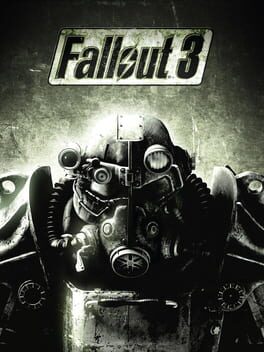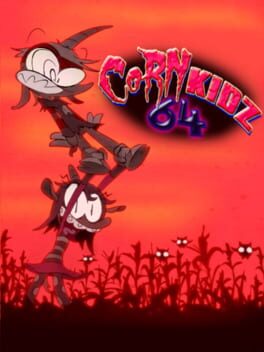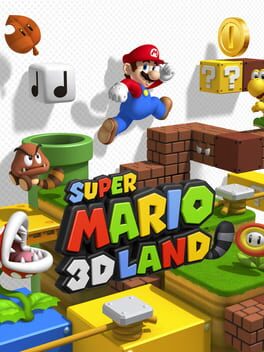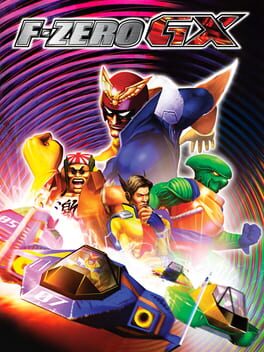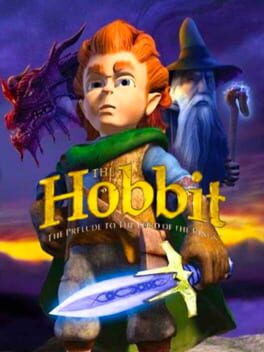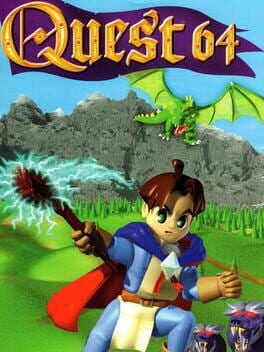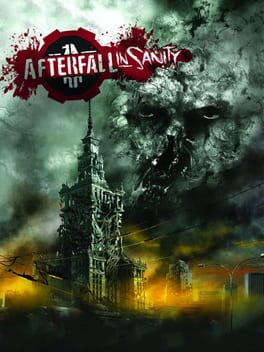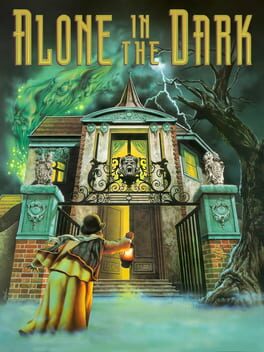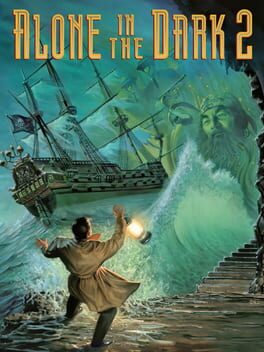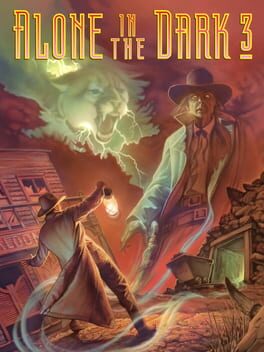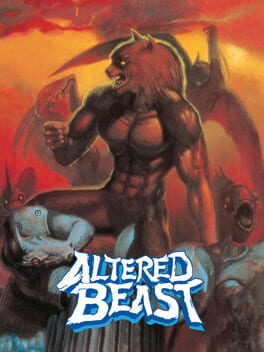eldomtom2
26 reviews liked by eldomtom2
Fallout 3
2008
This won best writing at the GDC Awards if you want to understand how dire video game writing and what's considered good writing has been. Emil Pagliarulo is the enemy of the written word, there is no clumsy piece of dialogue or ham-fisted theme he can't make worse beyond your wildest imagination.
The morality and gameplay have been completely gutted of previous Fallout complexity, and in its place the Bethesda formula has been injected. For what it's worth, it's not a bad formula. Exploration guarantees you finding something weird and interesting. Once you abandon the hope of finding something meaningful and thought-provoking and accept it as a series of vignettes of bizarre stuff it goes down cleaner.
It does abandon the Monty Python jokes of Fallout 2 though, which is a net improvement. Very much a mixed bag.
The morality and gameplay have been completely gutted of previous Fallout complexity, and in its place the Bethesda formula has been injected. For what it's worth, it's not a bad formula. Exploration guarantees you finding something weird and interesting. Once you abandon the hope of finding something meaningful and thought-provoking and accept it as a series of vignettes of bizarre stuff it goes down cleaner.
It does abandon the Monty Python jokes of Fallout 2 though, which is a net improvement. Very much a mixed bag.
Fallout 3
2008
One of the worse Fallout games, the surest sign of the irrevocable decline of the RPG as genre, Oblivion with guns, one of Bethesda's finest efforts. In my view, this is a game limited not by its shoddy execution but by its puny ambitions. Take the much maligned morality system of the game: will you defuse the bomb or nuke Megaton? The choice is mocked because the choice is obvious but enough is enough, let's be professional adults who do not condescend to professional adults: does anyone, perched atop some dilapidated hotel tower with a scenic view of the explosion REALLY think Todd Howard and company believed this was a grave moral quandary? It is so clearly not meant to be a dilemma. The point of the choice - the point of Fallout 3, to its ultimate detriment - is not to make you ponder good and evil but to give you the freedom to embrace extremes. In so being, the mutation is complete. The feint of fun in the original Fallout that gave way to a muted, omnipresent sadness has become the blatant substance of it all - post-apocalypse as playground.
It is within those unfortunate parameters that Fallout 3 can be considered a good time. The same way it was never meant to have you consider the weight of your actions, it was never meant for you to consider the weight of your gun. Comedically light, almost ornamental gunplay, interrupted anytime by the bored or thwarted player who pauses the flow of time to save time and find the next interesting attraction of the radioactive theme park. Fallout 3 pays homage to the shooter the same way it pays homage to the RPG, and arrives at something both lesser and special - it's the Bethesda guarantee. With the long-deserved revelations, reckonings, and admissions of Bethesda's myriad failures in our collective past, we can perhaps afford to be a little generous to this and Skyim, the supreme balancing acts between Bethesda's genre-skimming, aesthetic-appropriating, rigorously shallow method and the studio's mysteriously unprecedented and unmatched open world entertainment. Fallout 3 would be followed by New Vegas, 4, and 76, all of which made radical changes to 3 while keeping its true, solid, and generally underappreciated fundamentals: VATS, open world, diminished 1st person shooter, modified WRPGs. Influence or infection? That is each person's lot to decide, but both RPG Codex and Reddit can perhaps agree on this: in retrospect, this was the irreversible turning point, our last chance to be mindless before it came time to pay mind to how good and how bad things could be. This was the nuke of the Fallout franchise.
It is within those unfortunate parameters that Fallout 3 can be considered a good time. The same way it was never meant to have you consider the weight of your actions, it was never meant for you to consider the weight of your gun. Comedically light, almost ornamental gunplay, interrupted anytime by the bored or thwarted player who pauses the flow of time to save time and find the next interesting attraction of the radioactive theme park. Fallout 3 pays homage to the shooter the same way it pays homage to the RPG, and arrives at something both lesser and special - it's the Bethesda guarantee. With the long-deserved revelations, reckonings, and admissions of Bethesda's myriad failures in our collective past, we can perhaps afford to be a little generous to this and Skyim, the supreme balancing acts between Bethesda's genre-skimming, aesthetic-appropriating, rigorously shallow method and the studio's mysteriously unprecedented and unmatched open world entertainment. Fallout 3 would be followed by New Vegas, 4, and 76, all of which made radical changes to 3 while keeping its true, solid, and generally underappreciated fundamentals: VATS, open world, diminished 1st person shooter, modified WRPGs. Influence or infection? That is each person's lot to decide, but both RPG Codex and Reddit can perhaps agree on this: in retrospect, this was the irreversible turning point, our last chance to be mindless before it came time to pay mind to how good and how bad things could be. This was the nuke of the Fallout franchise.
Corn Kidz 64
2023
It's like if Banjo-Tooie's level structure was actually good and sane. Does the thing that game does where a level is like one big puzzle with multiple smaller ones to solve within it, but its not designed maliciously. Appreciate the way it really doesn't play like what has been standardized as the "good 3d platformer moveset", but still feels really good to nail. Has fall damage because its not cowardly. In general it feels like what Rare was going for with its harder platformer moments like Rusty Bucket Bay or all of Conker's Bad Fur Day but just not nearly as mean, but mean enough to be satisfying to beat. I think a lot of 3D platformer people have turned on Rare's n64 platformers for several reasons, but games like this show that there's still plenty of right lessons to take from those games besides "have a joke about balls" or "have more collectibles than God"
Corn Kidz 64
2023
Still craving polygonal platforming goodness after the brilliant Pseudoregalia, Corn Kidz 64 immediately jumped out to me. Where Pseudoregalia is sparse and ethereal, Corn Kidz 64 is densely packed and full of attention to detail, creating an immensely interactable platforming experience. It feels reminiscent of Banjo-Kazooie in this respect, but with a far more nuanced move set.
Seve is the perfect protagonist for his mechanics, this grungy little goat with a low centre of gravity being appropriately weighty, setting the pace for the explorative poking and prodding this world excels at. Both him and Pseudoregalia's own anthropomorphic goat protagonist serve as exemplars of platforming character design and animation, with each having a totally distinct style of platforming that is perfectly captured in their physicality.
I adore almost everything Corn Kidz 64 has going on, but unfortunately it's over far too soon. It's been described by the creator as a "pilot episode", so with any luck we'll eventually get the full show. If an increased scope can be achieved without sacrificing the amazing attention to detail on display here, Corn Kidz will be one of the best to ever do it.
Seve is the perfect protagonist for his mechanics, this grungy little goat with a low centre of gravity being appropriately weighty, setting the pace for the explorative poking and prodding this world excels at. Both him and Pseudoregalia's own anthropomorphic goat protagonist serve as exemplars of platforming character design and animation, with each having a totally distinct style of platforming that is perfectly captured in their physicality.
I adore almost everything Corn Kidz 64 has going on, but unfortunately it's over far too soon. It's been described by the creator as a "pilot episode", so with any luck we'll eventually get the full show. If an increased scope can be achieved without sacrificing the amazing attention to detail on display here, Corn Kidz will be one of the best to ever do it.
Super Mario 3D Land
2011
One of the first and most notable titles on the 3DS. It's not notable for being an amazing game or anything, it's just notable for being a 3D Mario game. And why shouldn't it? Mario is what started the entire 3D genre, and is the main innovator of it to this day. However, this title sits on a different couch than the main 3D titles. Unlike 64, Sunshine, the Galaxy games, Odyssey, and even it's direct sequel on Wii U, this black sheep of 3D Mario games doesn't do much to innovate. It's kinda just a 2D Mario game that decides to use the z-axis.
While 64, Sunshine, and Galaxy have their own unique controls and mechanics, 3D Land aims for something much more standard of the Mario franchise. What it does is take the formula of 2D Mario games and implement them in a 3D environment. This includes many things that make it completely different from every other 3D title.
Instead of a health bar, Mario's health is now determined by his current power-up. Small Mario has 1 hitpoint, a mushroom will turn that into 2, and any other power-up will make that 3. Levels are now incredibly linear and end at a flagpole rather than a collectible. Although the Galaxy games also had a somewhat linear level structure, there's still more room to explore as well as more depth to the level design itself.
Mario's moveset is withered down to fit with the "2D in 3D" environments. You've got the normal jump, side somersault, and long jump for basic movement options. No double or triple jump this time around, which is weird because those were also present in the New Super Mario Bros. games. Instead of a traditional backflip, you can crouch for a second to charge a backflip akin to the high jump in Super Mario Bros. 2. This move has little to no use and I cannot recall a single time I used it. Mario can roll by pressing the dash button while crouching, and this also has little to no use. This is only mandatory to use if there's a block in front of you that you needed to break and you don't have a tanooki suit. It's incredibly unreliable as a movement option because it has an insane amount of lag and doesn't increase your speed because of that. The weirdest thing about the movement is how stupid the normal jump is. It goes just as far, if not, further, than the long jump, goes about as high as the side somersault, and still allows you to keep your momentum after. If there's a jump you need to make to the flagpole and you need a lot of distance to get to it, don't long jump, a normal jump will do just fine. The inclusion of a dash button also feels somewhat redundant, mainly because there's never a single moment in which you won't be holding it down.
The power-ups don't change his basic moveset much aside from the tanooki suit, which is actually really fun to use. It allows you to hover and gain more speed with a weird dash crouch hop movement trick. The other power-ups are just there. The fire flower lets Mario shoot fireballs, and the boomerang flower lets Mario throw boomerangs. Nothing noteworthy outside of the tanooki suit.
To be fair, Mario's movement was made this way so it would fit the with level design perfectly. In that regard, I would say these movement options are fine. The level design present here is very linear. You need to get from the start to the flagpole, while collecting star coins along the way. You can really tell that this is just a 2D game brought over to 3D, because there's almost nothing special here that's noteworthy. Generic looking platforms on a generic looking background for every single level. There are almost no interesting gimmicks or design choices in general that caught my attention or made me think. The levels would enter my mind the moment I started them, and leave the instant I touched the flagpole. That's not to say that the level design is bad, far from it, but it lacks its own personality and identity. It doesn't help that the game directly after this, 3D World, adopted this exact same approach but with better level design.
There's nothing here that stands out to make this Mario title a unique experience. Everything that's present in 3D Land, you can find in 3D World with interest. The level design is boring and uninspiring, literally just taking 2D level themes and putting them in 3D. The movement is weirdly limiting and standardized. Say what you want about any of the other 3D titles, but when I pick one of those games up, there are differences aplenty. Each title gives Mario different movement options to help him traverse through the levels. No two games feel similar in the slightest. 3D Land takes the most standard movement options and does nothing new with them. The movement here feels like a 2D game at best and a more barren version of any other 3D game at worst. It fits the level design, sure, but it's definitely the most "Mario feeling" Mario game out there. This kind of standardization is even seen in the soundtrack. I can't recall a single original theme off the top of my head, every track is either a remix from Mario 3 or straight up recycled from the Galaxy games.
Something else to note is that this game is really easy. Like, Kirby levels of easy. The only times I found myself dying were because I was being impatient and trying to speed through the levels as fast as I could with no regard for my lives. Even the final level, which is supposed to be a super difficult gauntlet filled with obstacles seen throughout the whole game, is a joke compared to other gauntlet levels. Combine this with the tanooki suit, which lets you fly your way out of many dangers, and the whole game becomes a cake walk.
With all of that being said, I want to make it clear that this is far from a bad game, but it definitely is a very disappointing game. Mario 3D games are possibly the biggest game releases in the entire gaming industry, so to see a 3D title come out with nothing new to add to the table and nothing to say for itself is certainly sad to see. What's here is enjoyable, nothing more, nothing less. It fits the nature of many 3DS games of being easy to pick up for a couple of minutes and then put down again. If you want a very standardized game that's good fun the whole way through, then this fits the bill nicely. However, if you want a game that actually stands out, for better or for worse, then any of the other 3D titles will offer a much more memorable experience.
While 64, Sunshine, and Galaxy have their own unique controls and mechanics, 3D Land aims for something much more standard of the Mario franchise. What it does is take the formula of 2D Mario games and implement them in a 3D environment. This includes many things that make it completely different from every other 3D title.
Instead of a health bar, Mario's health is now determined by his current power-up. Small Mario has 1 hitpoint, a mushroom will turn that into 2, and any other power-up will make that 3. Levels are now incredibly linear and end at a flagpole rather than a collectible. Although the Galaxy games also had a somewhat linear level structure, there's still more room to explore as well as more depth to the level design itself.
Mario's moveset is withered down to fit with the "2D in 3D" environments. You've got the normal jump, side somersault, and long jump for basic movement options. No double or triple jump this time around, which is weird because those were also present in the New Super Mario Bros. games. Instead of a traditional backflip, you can crouch for a second to charge a backflip akin to the high jump in Super Mario Bros. 2. This move has little to no use and I cannot recall a single time I used it. Mario can roll by pressing the dash button while crouching, and this also has little to no use. This is only mandatory to use if there's a block in front of you that you needed to break and you don't have a tanooki suit. It's incredibly unreliable as a movement option because it has an insane amount of lag and doesn't increase your speed because of that. The weirdest thing about the movement is how stupid the normal jump is. It goes just as far, if not, further, than the long jump, goes about as high as the side somersault, and still allows you to keep your momentum after. If there's a jump you need to make to the flagpole and you need a lot of distance to get to it, don't long jump, a normal jump will do just fine. The inclusion of a dash button also feels somewhat redundant, mainly because there's never a single moment in which you won't be holding it down.
The power-ups don't change his basic moveset much aside from the tanooki suit, which is actually really fun to use. It allows you to hover and gain more speed with a weird dash crouch hop movement trick. The other power-ups are just there. The fire flower lets Mario shoot fireballs, and the boomerang flower lets Mario throw boomerangs. Nothing noteworthy outside of the tanooki suit.
To be fair, Mario's movement was made this way so it would fit the with level design perfectly. In that regard, I would say these movement options are fine. The level design present here is very linear. You need to get from the start to the flagpole, while collecting star coins along the way. You can really tell that this is just a 2D game brought over to 3D, because there's almost nothing special here that's noteworthy. Generic looking platforms on a generic looking background for every single level. There are almost no interesting gimmicks or design choices in general that caught my attention or made me think. The levels would enter my mind the moment I started them, and leave the instant I touched the flagpole. That's not to say that the level design is bad, far from it, but it lacks its own personality and identity. It doesn't help that the game directly after this, 3D World, adopted this exact same approach but with better level design.
There's nothing here that stands out to make this Mario title a unique experience. Everything that's present in 3D Land, you can find in 3D World with interest. The level design is boring and uninspiring, literally just taking 2D level themes and putting them in 3D. The movement is weirdly limiting and standardized. Say what you want about any of the other 3D titles, but when I pick one of those games up, there are differences aplenty. Each title gives Mario different movement options to help him traverse through the levels. No two games feel similar in the slightest. 3D Land takes the most standard movement options and does nothing new with them. The movement here feels like a 2D game at best and a more barren version of any other 3D game at worst. It fits the level design, sure, but it's definitely the most "Mario feeling" Mario game out there. This kind of standardization is even seen in the soundtrack. I can't recall a single original theme off the top of my head, every track is either a remix from Mario 3 or straight up recycled from the Galaxy games.
Something else to note is that this game is really easy. Like, Kirby levels of easy. The only times I found myself dying were because I was being impatient and trying to speed through the levels as fast as I could with no regard for my lives. Even the final level, which is supposed to be a super difficult gauntlet filled with obstacles seen throughout the whole game, is a joke compared to other gauntlet levels. Combine this with the tanooki suit, which lets you fly your way out of many dangers, and the whole game becomes a cake walk.
With all of that being said, I want to make it clear that this is far from a bad game, but it definitely is a very disappointing game. Mario 3D games are possibly the biggest game releases in the entire gaming industry, so to see a 3D title come out with nothing new to add to the table and nothing to say for itself is certainly sad to see. What's here is enjoyable, nothing more, nothing less. It fits the nature of many 3DS games of being easy to pick up for a couple of minutes and then put down again. If you want a very standardized game that's good fun the whole way through, then this fits the bill nicely. However, if you want a game that actually stands out, for better or for worse, then any of the other 3D titles will offer a much more memorable experience.
Super Mario 3D Land
2011
Super Mario 3D Land
2011
Nintendo tributes Super Mario Bros. 3, one of the most inventive, joyously meaningful leaps they've ever taken, by taking a bunch of iconography from it for their kinda lame advertisement for a side gimmick most people turned off anyway.
Ok it's not as bad as that makes it sound, but we're scraping the barrel of Nintendo's game design here. Literally one of the first ? blocks has the raccoon suit in it for you to fuck around with. The easy criticism is that they want you to remember old thing to feel good, but the real problem is that this game has a lack of progression. You don't get the cape in Super Mario World until the second area for a reason; that game had design principles and ideas to introduce and wanted you to get to grips with the basic movement before unleashing you with the cool shit. This is so important to the game that when I watched people play that lovely SMW ROM hack where it was remade from memory, one of the first big things that jumped out to people was that they gave you a cape in the first area. And yeah that's because we've all played it 1000 times, but also because it fucks with the progression in a clear way. I shouldn't have this. In 3D Land you get that item within 10 steps because there's nothing they want or need to teach you. We're all on autopilot and everyone knows all you need to do is run and jump.
There's no concept of how the disparate levels fit together through theming or design, just some vague idea of gradually increasing difficulty and making sure there aren't like two Ghonst Houses in a row. It's a linear sequence of level ideas Shigru Miyamo had inbetween giving bad instructions to the Paper Mario guys for fun. The thing is, a lot of those levels are pretty fun, even though Mario's moveset is by far the lamest it's ever been. It turns out the minimum viable product baseline Nintendo platformer is still enjoyable because they know basic movement, momentum, and how to direct you through a level. They know too much to fuck it up but weren't ambitious enough to make it good.
In conclusion: play 3D World instead. I really like that game despite a fair number of these criticisms also applying to that. Does that mean I'm full of shit? Probably. But presentation means a lot. Plus it has more everything AND that more is higher quality. It brings my brain electricity to higher than 0, which is what I want in life and love.
Ok it's not as bad as that makes it sound, but we're scraping the barrel of Nintendo's game design here. Literally one of the first ? blocks has the raccoon suit in it for you to fuck around with. The easy criticism is that they want you to remember old thing to feel good, but the real problem is that this game has a lack of progression. You don't get the cape in Super Mario World until the second area for a reason; that game had design principles and ideas to introduce and wanted you to get to grips with the basic movement before unleashing you with the cool shit. This is so important to the game that when I watched people play that lovely SMW ROM hack where it was remade from memory, one of the first big things that jumped out to people was that they gave you a cape in the first area. And yeah that's because we've all played it 1000 times, but also because it fucks with the progression in a clear way. I shouldn't have this. In 3D Land you get that item within 10 steps because there's nothing they want or need to teach you. We're all on autopilot and everyone knows all you need to do is run and jump.
There's no concept of how the disparate levels fit together through theming or design, just some vague idea of gradually increasing difficulty and making sure there aren't like two Ghonst Houses in a row. It's a linear sequence of level ideas Shigru Miyamo had inbetween giving bad instructions to the Paper Mario guys for fun. The thing is, a lot of those levels are pretty fun, even though Mario's moveset is by far the lamest it's ever been. It turns out the minimum viable product baseline Nintendo platformer is still enjoyable because they know basic movement, momentum, and how to direct you through a level. They know too much to fuck it up but weren't ambitious enough to make it good.
In conclusion: play 3D World instead. I really like that game despite a fair number of these criticisms also applying to that. Does that mean I'm full of shit? Probably. But presentation means a lot. Plus it has more everything AND that more is higher quality. It brings my brain electricity to higher than 0, which is what I want in life and love.
F-Zero GX
2003
"You don't win by being lucky; you win by being bold." - Captain Falcon
So F-Zero X is a pretty cool game. Perhaps a bit bare and a smidge held back by its hardware, but if you want a blisteringly fast and silky smooth racing experience with a heaping scoop of character and style, you need look no further. I've played plenty of great racers throughout the years, but I'd say that no other game has given me the same hit of adrenaline F-Zero X does.
Or anyways, no game did until I played GX.
A joint venture between Nintendo and Sega (and Namco, but I'm not here to talk about AX), F-Zero GX takes almost everything that I loved about X and brings it to new heights. It's faster, prettier, and definitely bolder.
On the content end of things, while F-Zero GX does drop a couple of features from X, it comes to the table with so much more in tow. Aside from the expected variety of tracks, racers and other unlockables, there's also a story mode and a custom machine builder, including an interface for crafting unique emblems. The added replay feature is a lovely addition for those that like immortalizing their favorite moments or reviewing their performance to look for ways to improve. There's a full suite of character profiles for the racers, giving you a means of getting up close and personal with them without the need for cracking open a manual. They even get their own theme songs!
Just for fun, here's a quick rundown of some of my favorite F-Zero contestants:
Mighty Gazelle - Was resurrected as a cyborg after a terrible accident in a previous grand prix. His new robotic body allows him to push his limits without fear of death.
Mrs. Arrow - A former F-Zero circuit model who is married to the heroic Super Arrow. She races to protect her husband on the track, but is a notably better pilot than him due to already being an experienced F-Zero entrant.
The Skull - A legendary racer from a grand prix that predates F-Zero by at least 200 years. He passed away long ago, but through the use of black magic, he came back to life because he just loves racing that damn much.
Leon - A survivor of war who now races to give hope to the people of his home planet. He plans to use his winnings to give a better life to the children of the orphanage he runs.
Draq and Roger Buster - A pair of deliverymen who had a couple of F-Zero machines turn up without addressees. Draq is a long-time F-Zero fanboy who prepped for his debut by playing the official F-Zero video games. He couldn't pass up the opportunity to participate in a race instead of simply watching them. Roger, on the other hand, is just entering to keep an eye on Draq and is hopeful the rightful owners of the machines will step up once they see their property out on the track.
Silver Neelsen - A longtime F-Zero participant who is now pushing 100 years of age. Even still, he's never won a title. He's considering retirement, but acknowledges he'll probably keep racing until he's dead.
Gomar and Shioh - They come from a planet where each individual finds a partner to live their lives with until they find a suitable mate. These two do everything together, and even have an entirely unique twin-cockpit machine.
And of course, Captain Falcon himself.
The tracks have become much more memorable, both in terms of visuals and designs. The Gamecube's strengths are on full display here, and each locale looks absolutely fantastic, to say nothing of the way improved special effects have augmented the feel of the action during a race. Energy streams out of the back of your machine as you boost, and violent sparks fly when colliding with another contender. All while still maintaining the eye-watering speed and buttery framerate you've come to expect. The visuals hold up pretty damn well even by today's standards. Meanwhile, new gimmicks and environmental hazards have been introduced that will demand lightning-fast reflexes on your part to stay in the game. Each circuit you clear is capped off by an interview with your chosen racer, which is a genuinely ingenious and charming little inclusion. It makes the world of F-Zero feel that much more alive and gives you an opportunity to get a few fun scenes from your favorite characters. All in all, GX takes an already solid experience and fills in the gaps. If you crave speed, it's top of its class on the Gamecube, and perhaps even in the broader genre all the way up to today.
Sega's influence is easy enough to see, both with regards to the racing mechanics and the changes in aesthetic. The latter is especially noteworthy, because the darker visuals and rock/metal soundtrack have given way to something much brighter and more cartoonish. While there are still some guitar riffs scattered here or there, most of the music has shifted to various flavors of techno. I happen to be a fan of both approaches, although I must admit having a stronger love for F-Zero X's angle. In particular, I'm not a huge fan of all of the changes made to the designs of some of the racers, and the newly-added characters stick out like sore thumbs. Still, this art direction fits F-Zero like a glove, and the added camp earns a few laughs while also occasionally looping back around into "just plain cool" territory. And of course, the OST is still excellent regardless of my own preferences.
I want to give a special shout out to the story mode because I feel it's the most underappreciated part of the experience. It's cheesy as hell and the CG hasn't held up especially well, but it is exactly what you would expect an F-Zero story to be. You follow around Captain Falcon as he tries to have a normal day before the next big F-Zero tourney. He dodges boulders in a high-speed canyon run, gets forced into a bet race, goes toe to toe with a street gang, saves a friend from an exploding building, reenacts the plot of Speed, and takes home the title belt before kicking the big bad's ass. And then, if that weren't enough, the final chapter involves the Cap being challenged to a race by who is essentially God. His reaction? To tell God to stuff it. And then he kicks God's ass, too. In the meantime you get little glimpses into the world of F-Zero and the people inhabiting it. It doesn't go nearly as deep as I would have liked, but I feel that it just captures the spirit of F-Zero so perfectly I can't help but love it. It's 100% the kind of narrative you would anticipate from a realm where bounty-hunters, superheroes, genetic experiments, pop stars and delivery drivers all compete for fame and fortune.
I mean, I do have some criticisms. The artificial difficulty quotient isn't necessarily any lower or higher than in the past - it simply shifted focus. Higher difficulties will still have you hounded relentlessly by vicious competitors who simply do not make mistakes and will scoop a win out from underneath you if you so much as sneeze. This, combined with the more hostile track design, will assuredly test your patience if you're a completionist. However, while the overall gameplay experience is arguably more hardcore than its predecessors, the relative chaos on the course also means a higher variance in placements amongst your rivals. This means that compared to F-Zero X (at least in my experience) taking home the cup doesn't always demand that you place 1st on every track. I haven't dared to brave the Master difficulty as of writing, so perhaps I simply have yet to experience true pain. Car-to-car combat is fairly awkward, much like in the previous game, and thus the systems attached to cratering troublesome opponents still feel like something of an afterthought. The same could be said for a significant portion of the available racers, as body is just an all-around inferior stat to boost and grip (and low-grip machines don't seem to benefit from a unique potential for some fancy drifting as they did in X). Thus, if you're really trying to win, you're likely to be limiting yourself to a small handful of characters. I think that improving your offensive options while also granting bonus ranking points for eliminations would be a solid move. It would give bulkier machines more relevance and would make aggressive playstyles more competitive. The story mode, while fun, is definitely a bit short and needing to unlock each chapter with credits feels like unnecessary padding. There's a good number of unlockables, but I feel things like the ship builder could have been expanded just a bit. A track editor would have been a welcome inclusion as well, especially since we never got the F-Zero X expansion pack stateside, and the return of a Death Race mode could have been good fun as well. All minor complaints in the end, and ones that I think could easily be ironed out should Nintendo ever opt for a port of this game.
Seriously, add a few layers of extra content and you're golden. Especially online multiplayer. F-Zero 99 showed that the potential is there. Thirty players on a single track, streaking by at supersonic speeds? Full tournaments with battle-royale style mechanics, and winners taking home trophies, credits and unique parts for their machines? There's nothing else out there like it. That's the kind of blood-pumping, nerve-twisting action that the genre needs right now. Maybe a few extra bells and whistles - redo the CG cutscenes, bring back some tracks and music from X and the SNES original, perhaps a custom pilot creator to go along with the machine builder. And something should probably be done about snaking. Leave it in the single-player modes if you can, but find a way to prevent it from being used online. I don't think it adds anything of benefit to the experience. Oh, and please add in the ability to reset a grand prix from any point in the process without needing to quit out to the main menu first. I have plenty of suggestions I could make on how to potentially improve an already great experience, but even with the handful of gripes I do have, I feel that Nintendo and Sega did a fantastic job here. It's about as close to perfection you can reasonably get, and the biggest complaint I have is that we haven't had a meaningful follow-up since.
This game came out twenty years ago.
General public perception seems to be that Nintendo simply doesn't see the value in releasing a new title. Perhaps they don't have any new concepts to build a game around, or maybe they don't want to pull any attention away from their "flagship" racing series, Mario Kart. Maybe they just flat out don't have any faith in it to make a splash even if they were to pour their best efforts into producing a new entry. I'm personally hung up on one particular quote from Shigeru Miyamoto in an interview with French site Gamekult about ten years back: "Why F-Zero? What do you want to see that hasn't been done yet?" Based on his statement, it would be easy enough to suggest that Mr. Miyamoto simply doesn't think the franchise has any untapped potential and thus isn't worth revisiting. However, I think he has a point. I'm not entirely sure what meaningful new features you could add to F-Zero because almost everything that I'd dare to ask for is already present in GX. If the goal was to make a completely new F-Zero, are we sure Nintendo could approach it in such a way that wouldn't ultimately draw unfavorable comparisons to their last fully-fledged offering? Obviously tastes differ from person to person, but you need look no further to see the potential for a misstep than Star Fox. There have been several new titles featuring Fox McCloud over the years, even as recently as 2016, but not a single one of them have reached the acclaim or sales numbers of 1997's Star Fox 64. After so many flops, wouldn't it be easier to say that we peaked long ago and leave it at that? Why invite the opportunity to leave a blemish on a series with an otherwise (mostly) sterling reputation? Maybe it's better to let sleeping dogs lie. We can remain content with F-Zero as it once was and still is. Maybe someday another challenger can carry the torch and introduce the world to a worthy successor of the King of Speed.
Which is what a coward would say.
I know we can do better. F-Zero simply has too much going for it to languish in a cobweb-ridden corner of Nintendo's basement. There is no reason why a company with so many timeless experiences under its belt couldn't make an absolute smash hit out of this franchise if they really wanted to. There is potential here to create the greatest racing game of all time. You may already feel that GX is the greatest racing game of all time, and I think that's valid. However, I firmly believe a new entry, if handled with love and care, could become the undisputed champion.
Be bold, Nintendo. I expect to see you out on the track.
So F-Zero X is a pretty cool game. Perhaps a bit bare and a smidge held back by its hardware, but if you want a blisteringly fast and silky smooth racing experience with a heaping scoop of character and style, you need look no further. I've played plenty of great racers throughout the years, but I'd say that no other game has given me the same hit of adrenaline F-Zero X does.
Or anyways, no game did until I played GX.
A joint venture between Nintendo and Sega (and Namco, but I'm not here to talk about AX), F-Zero GX takes almost everything that I loved about X and brings it to new heights. It's faster, prettier, and definitely bolder.
On the content end of things, while F-Zero GX does drop a couple of features from X, it comes to the table with so much more in tow. Aside from the expected variety of tracks, racers and other unlockables, there's also a story mode and a custom machine builder, including an interface for crafting unique emblems. The added replay feature is a lovely addition for those that like immortalizing their favorite moments or reviewing their performance to look for ways to improve. There's a full suite of character profiles for the racers, giving you a means of getting up close and personal with them without the need for cracking open a manual. They even get their own theme songs!
Just for fun, here's a quick rundown of some of my favorite F-Zero contestants:
Mighty Gazelle - Was resurrected as a cyborg after a terrible accident in a previous grand prix. His new robotic body allows him to push his limits without fear of death.
Mrs. Arrow - A former F-Zero circuit model who is married to the heroic Super Arrow. She races to protect her husband on the track, but is a notably better pilot than him due to already being an experienced F-Zero entrant.
The Skull - A legendary racer from a grand prix that predates F-Zero by at least 200 years. He passed away long ago, but through the use of black magic, he came back to life because he just loves racing that damn much.
Leon - A survivor of war who now races to give hope to the people of his home planet. He plans to use his winnings to give a better life to the children of the orphanage he runs.
Draq and Roger Buster - A pair of deliverymen who had a couple of F-Zero machines turn up without addressees. Draq is a long-time F-Zero fanboy who prepped for his debut by playing the official F-Zero video games. He couldn't pass up the opportunity to participate in a race instead of simply watching them. Roger, on the other hand, is just entering to keep an eye on Draq and is hopeful the rightful owners of the machines will step up once they see their property out on the track.
Silver Neelsen - A longtime F-Zero participant who is now pushing 100 years of age. Even still, he's never won a title. He's considering retirement, but acknowledges he'll probably keep racing until he's dead.
Gomar and Shioh - They come from a planet where each individual finds a partner to live their lives with until they find a suitable mate. These two do everything together, and even have an entirely unique twin-cockpit machine.
And of course, Captain Falcon himself.
The tracks have become much more memorable, both in terms of visuals and designs. The Gamecube's strengths are on full display here, and each locale looks absolutely fantastic, to say nothing of the way improved special effects have augmented the feel of the action during a race. Energy streams out of the back of your machine as you boost, and violent sparks fly when colliding with another contender. All while still maintaining the eye-watering speed and buttery framerate you've come to expect. The visuals hold up pretty damn well even by today's standards. Meanwhile, new gimmicks and environmental hazards have been introduced that will demand lightning-fast reflexes on your part to stay in the game. Each circuit you clear is capped off by an interview with your chosen racer, which is a genuinely ingenious and charming little inclusion. It makes the world of F-Zero feel that much more alive and gives you an opportunity to get a few fun scenes from your favorite characters. All in all, GX takes an already solid experience and fills in the gaps. If you crave speed, it's top of its class on the Gamecube, and perhaps even in the broader genre all the way up to today.
Sega's influence is easy enough to see, both with regards to the racing mechanics and the changes in aesthetic. The latter is especially noteworthy, because the darker visuals and rock/metal soundtrack have given way to something much brighter and more cartoonish. While there are still some guitar riffs scattered here or there, most of the music has shifted to various flavors of techno. I happen to be a fan of both approaches, although I must admit having a stronger love for F-Zero X's angle. In particular, I'm not a huge fan of all of the changes made to the designs of some of the racers, and the newly-added characters stick out like sore thumbs. Still, this art direction fits F-Zero like a glove, and the added camp earns a few laughs while also occasionally looping back around into "just plain cool" territory. And of course, the OST is still excellent regardless of my own preferences.
I want to give a special shout out to the story mode because I feel it's the most underappreciated part of the experience. It's cheesy as hell and the CG hasn't held up especially well, but it is exactly what you would expect an F-Zero story to be. You follow around Captain Falcon as he tries to have a normal day before the next big F-Zero tourney. He dodges boulders in a high-speed canyon run, gets forced into a bet race, goes toe to toe with a street gang, saves a friend from an exploding building, reenacts the plot of Speed, and takes home the title belt before kicking the big bad's ass. And then, if that weren't enough, the final chapter involves the Cap being challenged to a race by who is essentially God. His reaction? To tell God to stuff it. And then he kicks God's ass, too. In the meantime you get little glimpses into the world of F-Zero and the people inhabiting it. It doesn't go nearly as deep as I would have liked, but I feel that it just captures the spirit of F-Zero so perfectly I can't help but love it. It's 100% the kind of narrative you would anticipate from a realm where bounty-hunters, superheroes, genetic experiments, pop stars and delivery drivers all compete for fame and fortune.
I mean, I do have some criticisms. The artificial difficulty quotient isn't necessarily any lower or higher than in the past - it simply shifted focus. Higher difficulties will still have you hounded relentlessly by vicious competitors who simply do not make mistakes and will scoop a win out from underneath you if you so much as sneeze. This, combined with the more hostile track design, will assuredly test your patience if you're a completionist. However, while the overall gameplay experience is arguably more hardcore than its predecessors, the relative chaos on the course also means a higher variance in placements amongst your rivals. This means that compared to F-Zero X (at least in my experience) taking home the cup doesn't always demand that you place 1st on every track. I haven't dared to brave the Master difficulty as of writing, so perhaps I simply have yet to experience true pain. Car-to-car combat is fairly awkward, much like in the previous game, and thus the systems attached to cratering troublesome opponents still feel like something of an afterthought. The same could be said for a significant portion of the available racers, as body is just an all-around inferior stat to boost and grip (and low-grip machines don't seem to benefit from a unique potential for some fancy drifting as they did in X). Thus, if you're really trying to win, you're likely to be limiting yourself to a small handful of characters. I think that improving your offensive options while also granting bonus ranking points for eliminations would be a solid move. It would give bulkier machines more relevance and would make aggressive playstyles more competitive. The story mode, while fun, is definitely a bit short and needing to unlock each chapter with credits feels like unnecessary padding. There's a good number of unlockables, but I feel things like the ship builder could have been expanded just a bit. A track editor would have been a welcome inclusion as well, especially since we never got the F-Zero X expansion pack stateside, and the return of a Death Race mode could have been good fun as well. All minor complaints in the end, and ones that I think could easily be ironed out should Nintendo ever opt for a port of this game.
Seriously, add a few layers of extra content and you're golden. Especially online multiplayer. F-Zero 99 showed that the potential is there. Thirty players on a single track, streaking by at supersonic speeds? Full tournaments with battle-royale style mechanics, and winners taking home trophies, credits and unique parts for their machines? There's nothing else out there like it. That's the kind of blood-pumping, nerve-twisting action that the genre needs right now. Maybe a few extra bells and whistles - redo the CG cutscenes, bring back some tracks and music from X and the SNES original, perhaps a custom pilot creator to go along with the machine builder. And something should probably be done about snaking. Leave it in the single-player modes if you can, but find a way to prevent it from being used online. I don't think it adds anything of benefit to the experience. Oh, and please add in the ability to reset a grand prix from any point in the process without needing to quit out to the main menu first. I have plenty of suggestions I could make on how to potentially improve an already great experience, but even with the handful of gripes I do have, I feel that Nintendo and Sega did a fantastic job here. It's about as close to perfection you can reasonably get, and the biggest complaint I have is that we haven't had a meaningful follow-up since.
This game came out twenty years ago.
General public perception seems to be that Nintendo simply doesn't see the value in releasing a new title. Perhaps they don't have any new concepts to build a game around, or maybe they don't want to pull any attention away from their "flagship" racing series, Mario Kart. Maybe they just flat out don't have any faith in it to make a splash even if they were to pour their best efforts into producing a new entry. I'm personally hung up on one particular quote from Shigeru Miyamoto in an interview with French site Gamekult about ten years back: "Why F-Zero? What do you want to see that hasn't been done yet?" Based on his statement, it would be easy enough to suggest that Mr. Miyamoto simply doesn't think the franchise has any untapped potential and thus isn't worth revisiting. However, I think he has a point. I'm not entirely sure what meaningful new features you could add to F-Zero because almost everything that I'd dare to ask for is already present in GX. If the goal was to make a completely new F-Zero, are we sure Nintendo could approach it in such a way that wouldn't ultimately draw unfavorable comparisons to their last fully-fledged offering? Obviously tastes differ from person to person, but you need look no further to see the potential for a misstep than Star Fox. There have been several new titles featuring Fox McCloud over the years, even as recently as 2016, but not a single one of them have reached the acclaim or sales numbers of 1997's Star Fox 64. After so many flops, wouldn't it be easier to say that we peaked long ago and leave it at that? Why invite the opportunity to leave a blemish on a series with an otherwise (mostly) sterling reputation? Maybe it's better to let sleeping dogs lie. We can remain content with F-Zero as it once was and still is. Maybe someday another challenger can carry the torch and introduce the world to a worthy successor of the King of Speed.
Which is what a coward would say.
I know we can do better. F-Zero simply has too much going for it to languish in a cobweb-ridden corner of Nintendo's basement. There is no reason why a company with so many timeless experiences under its belt couldn't make an absolute smash hit out of this franchise if they really wanted to. There is potential here to create the greatest racing game of all time. You may already feel that GX is the greatest racing game of all time, and I think that's valid. However, I firmly believe a new entry, if handled with love and care, could become the undisputed champion.
Be bold, Nintendo. I expect to see you out on the track.
The Hobbit
2003
As for every ps2 games, nostalgia tends to cloud my judgements, and this game is not an exception.
A pretty faithful journey, this game tells the story of Bilbo Baggins, and it does with a really good art direction in all levels; every level seems crafted with a precise intention in what it tries to convey, and that is something that can't be taken for granted, even in today's game landscapes, where there is often an almost absurd search for photorealism, without even considering art direction.
The combat is the weak spot of this game: as much as I liked finding all the scrolls to power up Sting and throwing rocks, it's pretty much just press square and do some jump attacks when someone with a shield appears.
In general, the gameplay is good enough, and the "stealthy" sections are pretty good for what they are.
As a whole, this videogame is good: the art direction is really good, and it helps when the gameplay is not that tight or good.
A pretty faithful journey, this game tells the story of Bilbo Baggins, and it does with a really good art direction in all levels; every level seems crafted with a precise intention in what it tries to convey, and that is something that can't be taken for granted, even in today's game landscapes, where there is often an almost absurd search for photorealism, without even considering art direction.
The combat is the weak spot of this game: as much as I liked finding all the scrolls to power up Sting and throwing rocks, it's pretty much just press square and do some jump attacks when someone with a shield appears.
In general, the gameplay is good enough, and the "stealthy" sections are pretty good for what they are.
As a whole, this videogame is good: the art direction is really good, and it helps when the gameplay is not that tight or good.
Quest 64
1998
Taking a quick glance at reviews for Quest 64 will show you that a very vocal minority of players badly want to convince you that this game is unfairly judged, a secret gem you've all been sleeping on because of bad word of mouth. Look, I can kind of understand why people make this argument for Castlevania 64, after all it is a maligned entry in a beloved series, there was always going to be fans lining up to defend it, and occasionally you can see the skeleton of a good game rattling around in there. Making excuses for Quest 64 is like saying you don't think your dog's crap smells that bad, which is why you let it shit indoors. In all fairness, Nintendo 64 fans have like, 20 or so games that are actually worth playing, they have to convince themselves that there's more than that. I ought to know, because I am one. I bought this game. I am no better than those I throw rocks at.
Quest 64 puts you in control of Brian, an aspiring mage who has to save Not Ireland from the evil Mammon. That's uh, all there is to it. There's not much of a story in Quest 64, the wikia for the game barely has more than two sentences of information to provide context to Mammon's backstory and motives. The gameplay is similarly starved for complexity. The battle system relies upon four core elements from which Brian draws his strength, though the pool of spells each element provides you is extremely shallow and never really amounts to much more than "You have a rock spell for damage. You have a rock spell for more damage. You have a rock spell for the MOST damage." I swear to you it's even less involved than Pokemon Red/Blue, a game that was by its creator's own admission meant to be children's first RPG; there is nothing to sink your teeth into here.
There's not even a currency system in the game, any items you obtain are just given to you. Probably the most interesting mechanic in Quest 64 is its experience system, which is essentially a watered-down version of Final Fantasy II's. Brian's stats build the more each stat is relied upon, which basically translates to letting Brian get his ass beat so his defense and health goes up. On paper it sounds ridiculous, but in practice it's just tedious. But then, Quest 64 is tedious by its very nature so I guess that tracks.
Even basic progression through the story amounts to doing the same thing over and over again, and it's never interesting to begin with. Some bad guy steals a spell book or other magic item from the lord of the current town you're in and this has prevented anyone from traveling to the next town, including you. Beat up the area boss and return the item then go to the next village where you will do the same exact thing. The whole game is this. Dungeons are empty and exploration is mindless, there's no interesting gimmicks to keep you invested while battling your way to the boss, and while I have nothing against dungeon crawlers inherently (I like the SNES Shin Megami Tensei games for chrissake), the lackluster battle system and virtually non-existent sense of progression makes the game a total chore.
There exists a mod for this game called Quest 64: Hard Mode which seeks to fix numerous issues with the core game. I am reminded of Project 06, which similarly tries to right some of Sonic 2006's wrongs, and that brings me to a fun little thought experiment I've been mulling around for a while. I call it The Hedgehog of Theseus. At what point do you fix too much of a notoriously bad game that it no longer shares the original's identity? In the case of Sonic 2006 I would argue making even one loading screen last a second less is changing too much of its soul. It is a bad game, it is for some the bad game, and I believe the only way to truly appreciate it is to experience it as it is.
Similarly, by trying to rebalance Quest's stat and experience system, by giving Brian a more varied list of spells, by adding more complexity and making every effort to create a more engaging game, you're straying further and further from what Quest 64 is. It's a bit paradoxical, but Quest 64 is interesting because it's so boring, a version of it that plays better would arguably make it even more banal. I'm not completely against the practice of modding games, good or bad. Streets of Rage 3 has mods that actually make it worthwhile, Contra: Hard Corps is amazing as-is but is improved by restoring hit points, but there are certain games whose identities are so inextricably linked to the state they released in that to assemble them into something better completely misses the point.
Quest 64 is a bad game. Long live Quest 64.
Quest 64 puts you in control of Brian, an aspiring mage who has to save Not Ireland from the evil Mammon. That's uh, all there is to it. There's not much of a story in Quest 64, the wikia for the game barely has more than two sentences of information to provide context to Mammon's backstory and motives. The gameplay is similarly starved for complexity. The battle system relies upon four core elements from which Brian draws his strength, though the pool of spells each element provides you is extremely shallow and never really amounts to much more than "You have a rock spell for damage. You have a rock spell for more damage. You have a rock spell for the MOST damage." I swear to you it's even less involved than Pokemon Red/Blue, a game that was by its creator's own admission meant to be children's first RPG; there is nothing to sink your teeth into here.
There's not even a currency system in the game, any items you obtain are just given to you. Probably the most interesting mechanic in Quest 64 is its experience system, which is essentially a watered-down version of Final Fantasy II's. Brian's stats build the more each stat is relied upon, which basically translates to letting Brian get his ass beat so his defense and health goes up. On paper it sounds ridiculous, but in practice it's just tedious. But then, Quest 64 is tedious by its very nature so I guess that tracks.
Even basic progression through the story amounts to doing the same thing over and over again, and it's never interesting to begin with. Some bad guy steals a spell book or other magic item from the lord of the current town you're in and this has prevented anyone from traveling to the next town, including you. Beat up the area boss and return the item then go to the next village where you will do the same exact thing. The whole game is this. Dungeons are empty and exploration is mindless, there's no interesting gimmicks to keep you invested while battling your way to the boss, and while I have nothing against dungeon crawlers inherently (I like the SNES Shin Megami Tensei games for chrissake), the lackluster battle system and virtually non-existent sense of progression makes the game a total chore.
There exists a mod for this game called Quest 64: Hard Mode which seeks to fix numerous issues with the core game. I am reminded of Project 06, which similarly tries to right some of Sonic 2006's wrongs, and that brings me to a fun little thought experiment I've been mulling around for a while. I call it The Hedgehog of Theseus. At what point do you fix too much of a notoriously bad game that it no longer shares the original's identity? In the case of Sonic 2006 I would argue making even one loading screen last a second less is changing too much of its soul. It is a bad game, it is for some the bad game, and I believe the only way to truly appreciate it is to experience it as it is.
Similarly, by trying to rebalance Quest's stat and experience system, by giving Brian a more varied list of spells, by adding more complexity and making every effort to create a more engaging game, you're straying further and further from what Quest 64 is. It's a bit paradoxical, but Quest 64 is interesting because it's so boring, a version of it that plays better would arguably make it even more banal. I'm not completely against the practice of modding games, good or bad. Streets of Rage 3 has mods that actually make it worthwhile, Contra: Hard Corps is amazing as-is but is improved by restoring hit points, but there are certain games whose identities are so inextricably linked to the state they released in that to assemble them into something better completely misses the point.
Quest 64 is a bad game. Long live Quest 64.
